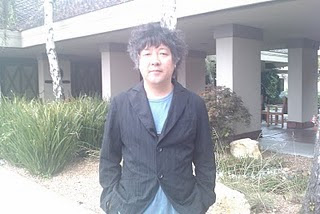 |
| Credit to Haegwan Kim |
Haegwan Kim: Today I’m going to talk with Ken Mogi. He’s a renowned brain scientist in Japan. Thank you so much for your time.
Ken Mogi: Thank you for having me.
HK: So let me start by asking why do you study the brain?
KM: Well, to understand human nature.
HK: Can you tell me how the brain affects our behaviour?
KM: Brain science is connected to many other fields and has huge effects on our daily life. Maybe you’ve heard about it; neuroeconomics is a combination with economic discipline, also neuromarketing, which is a new field trying to combine knowledge gained from the brain sciences with marketing techniques. Today we can see lots of different disciplines resonating with the brain sciences, including ethics. So, it’s quite an exciting time to be in the field because its effect on human behavior is becoming bigger and bigger.
HK: What is the biggest question for brain scientists at the moment?
KM: The mind-brain problem. How consciousness arises from the neuro-activities in the brain, so that’s the Holy Grail, so to speak, of the brain sciences.
HK: I’m really interested in the relationship between the mind and our brain, because at first the brain is like some substantial…
KM: Yes, it’s a physical entity.
HK: And mind is rather not.
KM: Sure.
HK: What do you think about their relation? Quite difficult to grasp isn’t it?
KM: Well, there are many different ways to think about the relation between the brain and the mind, and as I say, it’s one of the greatest scientific mysteries left to be solved. Many people say that we can’t solve it, but we are trying to solve it. Actually, this sci-fi conference, there are many people who are interested in that particular aspect of brain science so, well, we’ll see. Maybe we can solve it.
HK: Can I ask your definition of success?
KM: I think there are many different successes. People can just sometimes take advantage of other people and be successful. But I think the greatest form of success is to create new things so that you and others can achieve success at the same time. For example, the creation of the Internet and web based services like Google, that would be the greatest success on the scale, because that can make other people also happy and more creative.
HK: As you’re a brain scientist, I”m just wondering how the brain affects people achieving success.
KM: Nothing comes from nothing, so you accumulate your experience, memories, in the association cortex of the temporal lobe, and then these memories start recombining among themselves. We don’t know the process details of the process yet, but it’s the combination. So through the combination of different elements stored in your memory system, new things come out, and this chemistry of reaction is directed by what you have as a vision or a goal in the prefrontal cortex. So it’s a corroboration between the prefrontal cortex and the temporal lobe.
In order to achieve success, you need to do two things; to accumulate as much experience as possible, just like you’re trying to do; I mean, interviewing people and travelling around the world; and then to have a vision.
HK: If I would try to say that in a very easy way; can I say “to achieve success, do as many things as you can to stimulate the brain”?
KM: Yes. Actually, there’s interesting research. It’s called Flynn’s effect, James Flynn. He’s a New Zealand psychologist. He found that the average IQ in industrialised countries is increasing at a constant rate; about seven points a decade. But this is strange, because our genetic materials have not changed that much. Some people say that this is due to the emergence of new media like the Internet, TV, radio since our brains are processing more information per unit of time, so that our thinking processes are actually accelerating.
HK: Does that mean human beings are getting smarter and smarter?
KM: Yes, in a sense, in terms of accumulating and processing and handling information. But I don’t know; maybe we are getting dumber in other aspects, I don’t know.
HK: In what sense we become more stupid?
KM: Like being in less contact with nature. I think we are losing something at the same time. I mean, we’re gaining, but at the same time we might be losing something valuable. There would always be tradeoffs.
HK: Can we say we are becoming more rational creatures?
KM: That’s an interesting question. Well but what do you exactly mean by rational?
Haegwan Kim is a writer who was born in Osaka, Japan in 1989 and grew up near Tokyo where went to a Korean school for 12 years.








